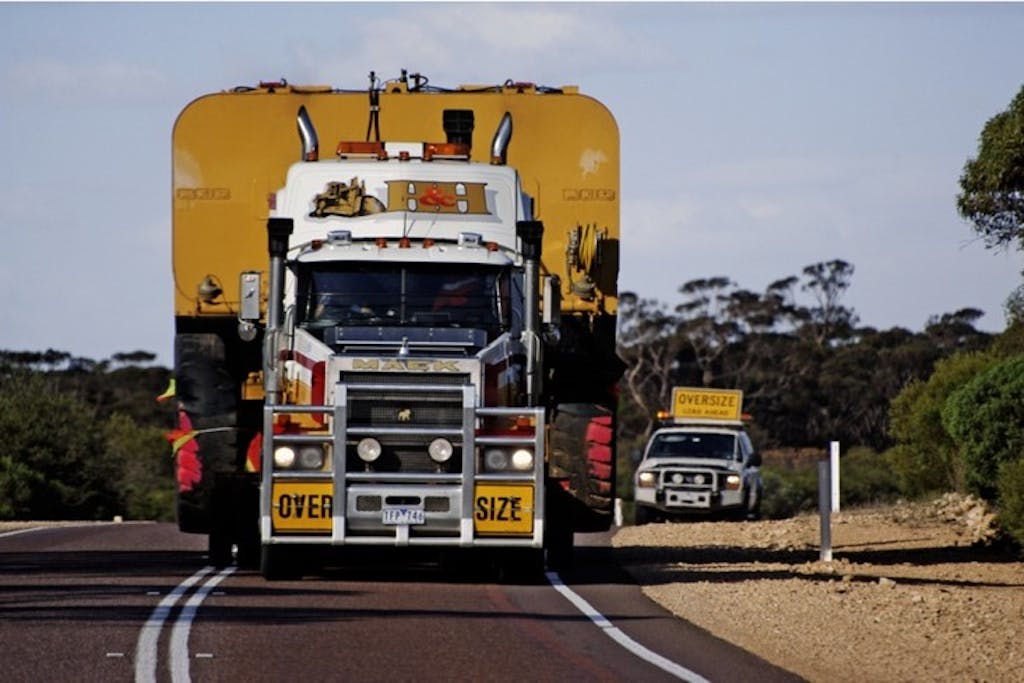Wide Load & Oversize Load Regulations and Permits
June 30th, 2025
Regulations exist for a reason: safety. Oversize hauls change how vehicles handle and stop. They affect road stress, infrastructure limits, and traffic flow. And if you skip the permits? You’re opening the door to fines, denied insurance claims, and legal issues that follow you across state lines.
This guide walks you through what qualifies as an oversize load, what permits you’ll need, how to get them, and the penalties for getting it wrong.
Is Your Load Oversize? Quick Tests
Federal Baseline Dimensions
- Width: 8 ft. 6 in.
- Height: 13 ft. 6 in.
- Weight: 80,000 lbs GVWR
If your vehicle or load exceeds these, chances are you’ll need a permit. Always check both load and trailer specs.
State Trigger Points
Some states are stricter. For example:
- New York: 12 ft wide = trigger
- Texas: higher weight limits but low tolerance on axle groups
- Michigan: known for strict frost laws, detailed superload paperwork, and unique weekend travel limits
Pro tip: Use your truck’s routing software or check the state DOT site before you roll.
Permit Types & Costs
Single-Trip vs. Annual Permits
- Single-trip: Good for one haul from A to B.
- Annual: Better if you run the same type of load regularly.
States like Georgia and Pennsylvania have digital apps now to simplify the permit process.
Superload & Weight-Only Permits
- A “superload” is usually 16 ft wide or 250K+ lbs.
- Some states demand special route surveys and on-site engineering sign-off.
Typical Fees
- Basic state permit: $15–$350 depending on state (2025 schedules)
- Processing fees: Extra for night moves, escorts, or weekend runs
How to Secure an Oversize Load Permit
Getting legal starts with prep. Here’s a basic checklist to avoid permit rejection:
5-Step Checklist
- Measure everything—accurately (height, width, axle groups)
- Get a route survey if crossing restricted bridges
- File with the state permit portal (some allow up to 48 hrs for approval)
- Print or carry a digital copy of your permit
- Most permits are valid for 1 to 12 days, depending on the state
Need to haul longer than that? Call the DOT directly—some states offer extensions if requested early.

Route & Roadside Requirements
Once your load qualifies as oversize, there’s more for you to do than just fill out paperwork. You also need to modify how you operate on the road. From pilot cars to safety gear, every detail matters. State DOTs set their own rules, so staying compliant means knowing exactly what’s required before you roll.
The guidelines below cover common requirements, but always verify specifics with the states you’ll be traveling through.
Escort / Pilot-Car Rules
Escort vehicles are often required when:
- Width > 12 ft.
- Height > 14 ft.
- Superload hauls or crossing city zones with unique restrictions
Each state sets rules on distance from the load, signage, radio contact, and lane control.
Flags, Banners & Lights
Most DOTs require:
- Red warning flags (18×18 inches)
- “OVERSIZE LOAD” banners front and back
- Flashing amber lights or strobes (especially at night)
Double-check for weekend/night driving restrictions. Some states prohibit oversize travel on Sundays or during rush hour.
Time-of-Day & Holiday Curfews
Oversize load travel rules aren’t set in stone. Many states adjust curfews and restrictions each year based on traffic patterns and safety data. As of early 2025, several states tightened their limits on holiday and weekend travel, and it’s likely others will follow. Always check the latest state DOT guidelines before hitting the road.
New rule updates for 2025: Many states now ban travel after noon on major holidays and weekends.
- Florida: 11 AM cutoff on Saturdays
- New Jersey: restrictions on all non-daylight oversize hauls
State Spotlights: Know These Gotchas
Some states play by their own rules—and they’re not always intuitive. Whether it’s advance notice, unexpected width limits, or special permits, certain areas have quirks that can catch even seasoned haulers off guard.
Here are a few examples of states where it pays to read the fine print before you move. Always confirm the latest rules with the DOTs in the states you’re traveling through—local requirements can change with little notice.
- California: 24-hour CHP notice needed for wide loads on I-5
- New York City: 10 ft. limit in some boroughs; must get special permits for 12 ft.+
- Texas: Overweight hauls must carry HP-125 if over 125k lbs GVW
Always check local DOT pages. The rules change fast.

Penalties & Real-World Lessons
Get it wrong and it’s going to cost:
- Fines often run $500–$10,000, plus escort and police charges
- Connecticut once ticketed $6,000 for no permit and revoked license for 30 days
- Insurance companies won’t cover non-permitted oversize incidents
Bottom line: the cost of skipping a permit is almost never worth it.
The Right Trailer Makes the Job Easier
Oversize regulations might be a headache, but the right trailer can make your haul a lot simpler. Whether you’re moving heavy equipment, long materials, or specialty loads, having the proper trailer under you matters just as much as having the right paperwork in hand.
Hale Trailer has one of the largest inventories in the country—so when it’s time to get moving, we’ve likely got exactly what you need to haul it right.
All the information on this website – https://www.haletrailer.com – is published in good faith and for general information purposes only. Hale Trailer Brake and Wheel does not make any warranties about the completeness, reliability and accuracy of this information. Any action you take upon the information you find on this website, is strictly at your own risk. Hale Trailer Brake and Wheel will not be liable for any losses and/or damages in connection with the use of our website.
